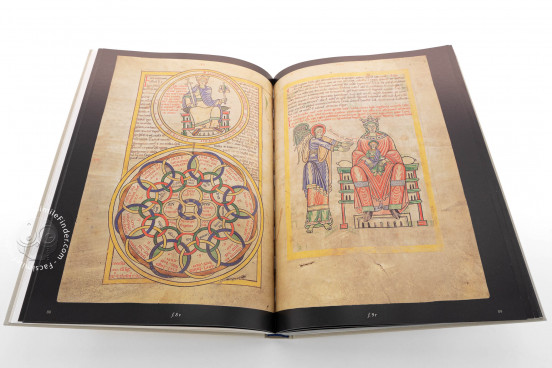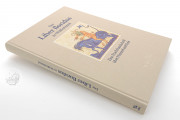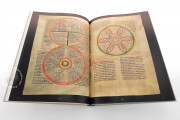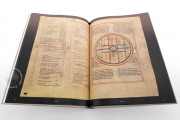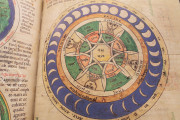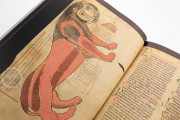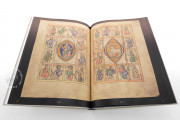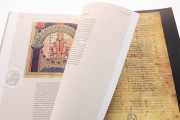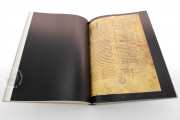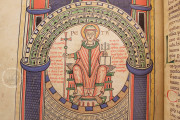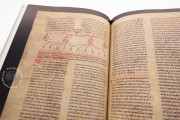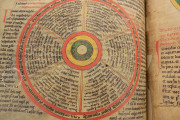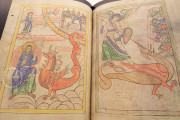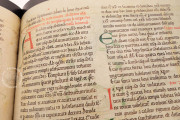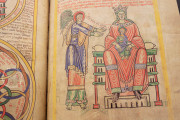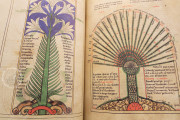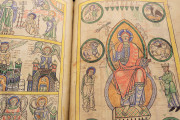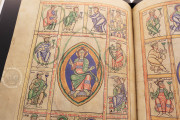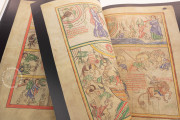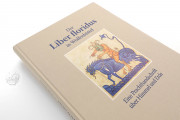The Liber Floridus—Book of Flowers—is an encyclopedic compilation of knowledge drawing on diverse ancient and early medieval sources on topics spanning geography, mathematics, history, grammar, and astronomy. The Wolfenbüttel copy, dating from the mid-twelfth century and one of the earliest, is richly illustrated with dozens of diagrams, charts, and narrative pictures elucidating concepts presented in the text. Created in Northern France, Hainaut, or Flanders, it is an early source of secular illumination.
This is one of nine surviving manuscript copies of the Liber Floridus, a text compiled by Lambert of Saint-Omer in the early twelfth century. The oldest is Ghent, Universiteitsbibliotheek, MS 92, which was Lambert's original. The Wolfenbüttel copy presents the work in a large format with vibrantly colored illuminations rich in detail.
A Bouquet of Heavenly Flowers
Loosely arranged according to sacred history extending from Creation to the Last Judgment, the Liber Floridus is a metaphorical bouquet of individual flowers of knowledge. Christian subject matter is well represented among the Wolfenbüttel manuscript's illustrations, including a series of thirteen full-page miniatures devoted to events described in the Apocalypse (fols. 9v-15v), absent from Lambert's original.
Diagrams of the Natural World
The natural world is also pictured, often in the form of diagrams, including ones explicating the phases of the moon (fol. 17r), climate zones (fols. 59v-60r), and the stars and the planets (fol. 61v). A charming drawing of a lion accompanied by a diminutive pig is inscribed "king of the beasts" (fol. 37v), and a world map occupies two facing pages (fols. 69v-70r)
Tinted Drawing Technique
The scenes and diagrams in the Wolfenbüttel Liber Floridus are executed as tinted line drawings, with outlines in black or colored ink and colored washes applied to some of the surfaces, giving them an appealing fresh appearance. Even the framed miniatures include much reserve (blank) parchment.
Renaissance of the Twelfth-Century
The twelfth century saw a dramatic shift in learning and education in Europe. The first universities were established in Bologna and Paris, contributing to a growing body of intellectuals curious about how the natural world contained information about the will and motives of the Creator.
The appearance of manuscripts changed with the new emphasis on learning, and the Wolfenbüttel manuscript presents its content in the increasingly popular two-column format. The text is in the Transitional Script of the long twelfth century and employs common abbreviations. Major divisions of the text are demarcated with enlarged, colored initials and titles in red.
It is unknown whence Marquard Gude (1635-1689) obtained the manuscript. After Gude's death, it came with most of his impressive collection of Greek and Latin manuscripts to the Herzog-August-Bibliothek through the agency of its then librarian, the philosopher Gottfried Wilhelm Leibniz (1646-1716).
We have 1 facsimile edition of the manuscript "Liber Floridus": Der Liber floridus in Wolfenbüttel: eine Prachthandschrift über Himmel und Erde facsimile edition, published by WBG (Wissenschaftliche Buchgesellschaft), 2014
Request Info / Price
